The marketing landscape in Trinidad and Tobago is facing a critical challenge. Many companies are falling behind in their understanding of modern marketing practices, especially in the digital realm. As the industry continues to evolve rapidly, management and HR departments are struggling to keep up. They aren’t upgrading their knowledge, leading to misaligned job roles, outdated strategies, and inefficient teams. This article explores whether there are truly good marketing jobs available and highlights the underlying issues that are holding the industry back.
The Core Problem: Companies’ Knowledge Gap in Marketing
1. Management and HR Are Out of Touch
One of the biggest issues in Trinidad and Tobago’s marketing landscape is that many companies, especially at the management and HR levels, have not updated their understanding of what modern marketing entails. Marketing has evolved dramatically over the past decade with the rise of digital technologies, but many companies still operate with a traditional mindset. This is evident in the way they structure their marketing teams, the type of roles they create, and the way they recruit talent.
- Lack of Understanding of Digital Marketing Roles: In today’s era, digital marketing requires specialized skills in areas such as SEO, social media strategy, content marketing, email marketing, PPC (pay-per-click) advertising, and analytics. However, companies often fail to recognize the distinct nature of these skills. As a result, they combine multiple specializations into single roles, as seen in many job descriptions. Management and HR departments seem unaware of the complexities and depth required for each role, leading to poorly structured teams that lack the right expertise to thrive in today’s digital ecosystem.
- Failure to Understand Digital Tools and Strategies: Management teams also don’t fully grasp the vast array of tools and strategies available in modern marketing. They remain focused on outdated models like traditional media buying and offline promotions, while digital marketers require proficiency in tools like Google Analytics, HubSpot, Facebook Ads, and various SEO platforms. Because management is not familiar with these tools, they fail to create the right infrastructure or invest in the necessary training and resources that can elevate their marketing efforts.
2. Old-School Marketing Focus
- Reliance on Trade Marketing and Media Buying: Many marketing teams in Trinidad and Tobago still operate under a trade marketing framework, focusing on physical promotions and traditional media (TV, radio, print). While these methods have their place, they are no longer sufficient on their own. The digital marketing ecosystem, which includes targeted ads, influencer marketing, and data-driven campaigns, is essential for modern businesses. Unfortunately, companies have been slow to adapt, and their teams lack the skills or training to manage these newer methods effectively.
- Limited Digital Marketing Knowledge: Beyond media buying and trade promotions, many local marketing teams have a shallow understanding of other digital marketing practices such as SEO, content marketing, and email marketing. They struggle with executing comprehensive strategies that incorporate a full spectrum of digital tactics. As a result, companies often outsource their digital marketing to agencies, but because they don’t fully understand how to work with these agencies, they fail to get the full value out of those partnerships.
Breakdown of Examples from Job Descriptions
Let’s look at specific examples of job descriptions from the images and the Massy Digital Marketing Specialist role to highlight why these roles are problematic:
Atlantic Trading Co. Digital Media Coordinator Role
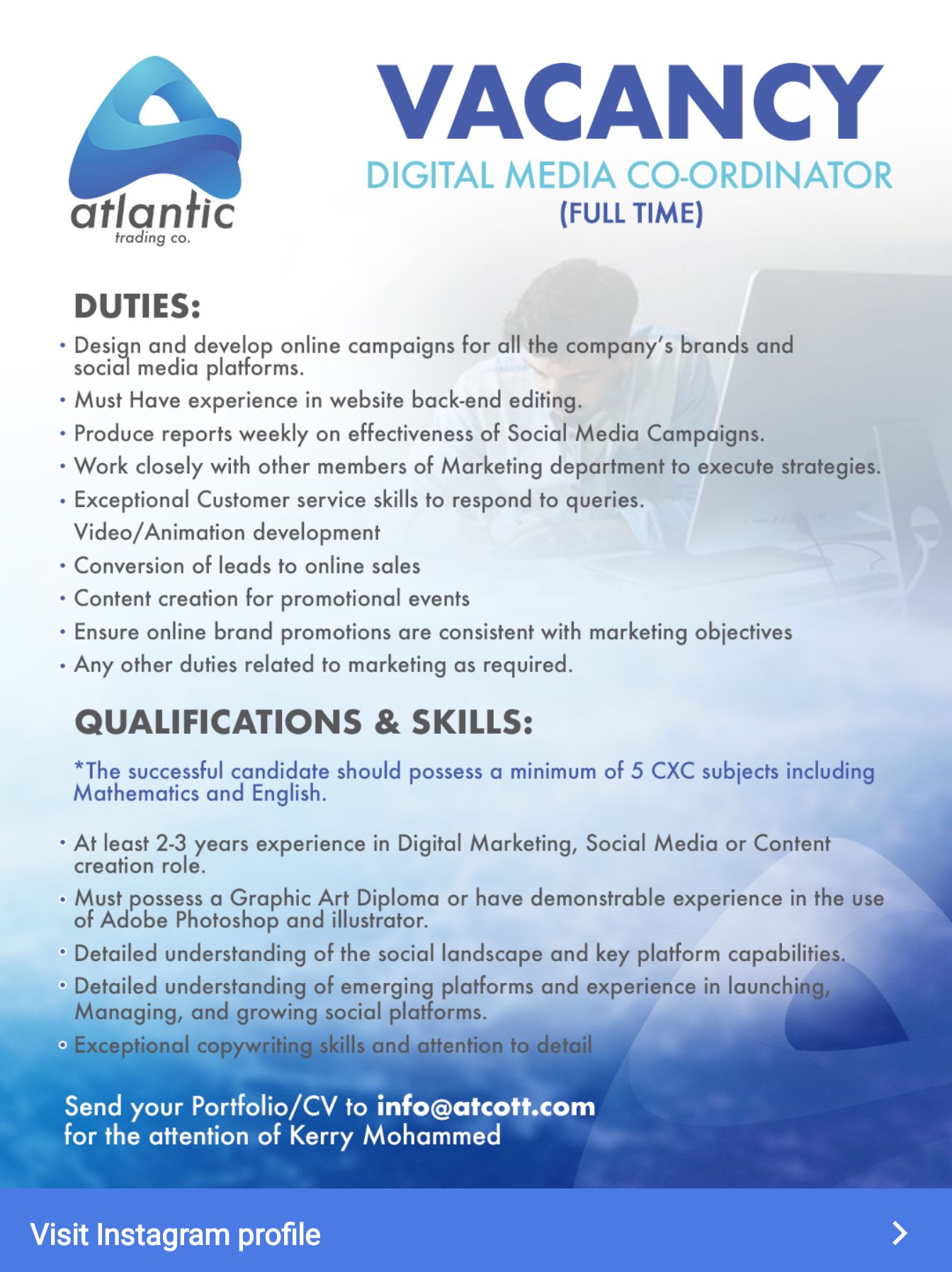
This job description asks for everything from social media management to website back-end editing, video/animation development, and customer service skills. This is a prime example of role compression, where multiple specializations are jammed into one position. The company fails to recognize that each of these tasks requires a unique skill set and substantial time investment. Expecting one person to effectively manage all these areas reflects a lack of understanding from management about the intricacies of digital marketing.
MovieTowne Marketing Officer Role
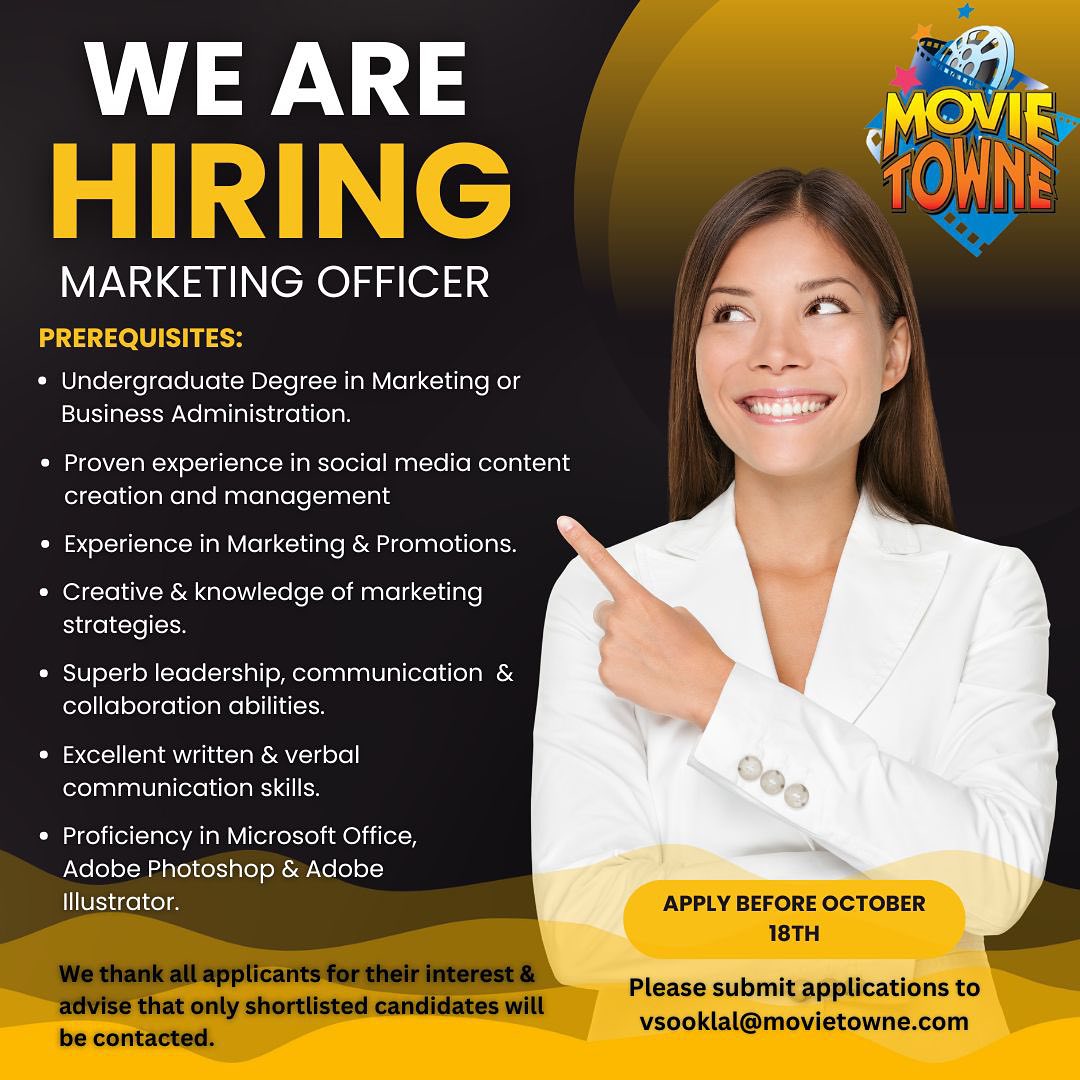
The job ad calls for experience in social media, marketing promotions, creative marketing strategies, and proficiency in Adobe software, among other tasks. Once again, we see a wide range of skills being requested for one role, with no mention of relevant industry certifications (e.g., Google Analytics, HubSpot, etc.) that are standard in digital marketing positions. This shows that HR teams are not aware of the need for specialized expertise in today’s marketing landscape.
Massy Digital Marketing Specialist Role
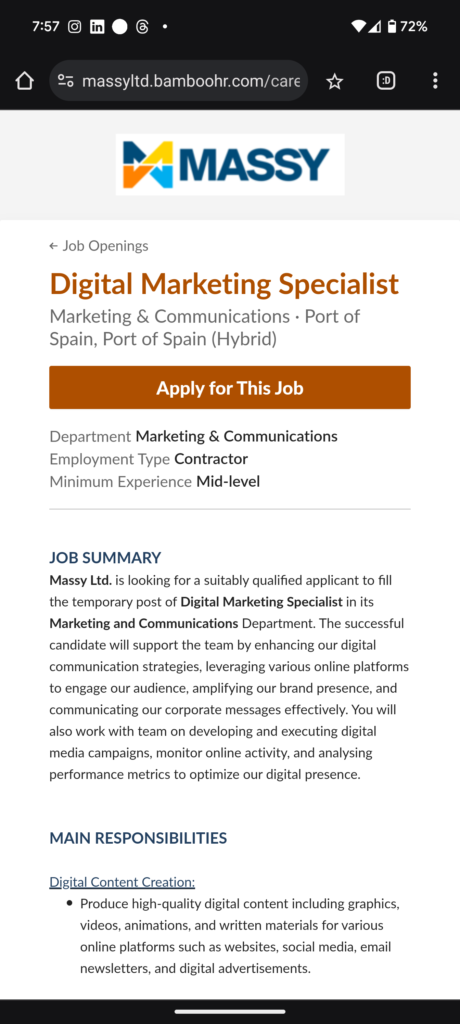
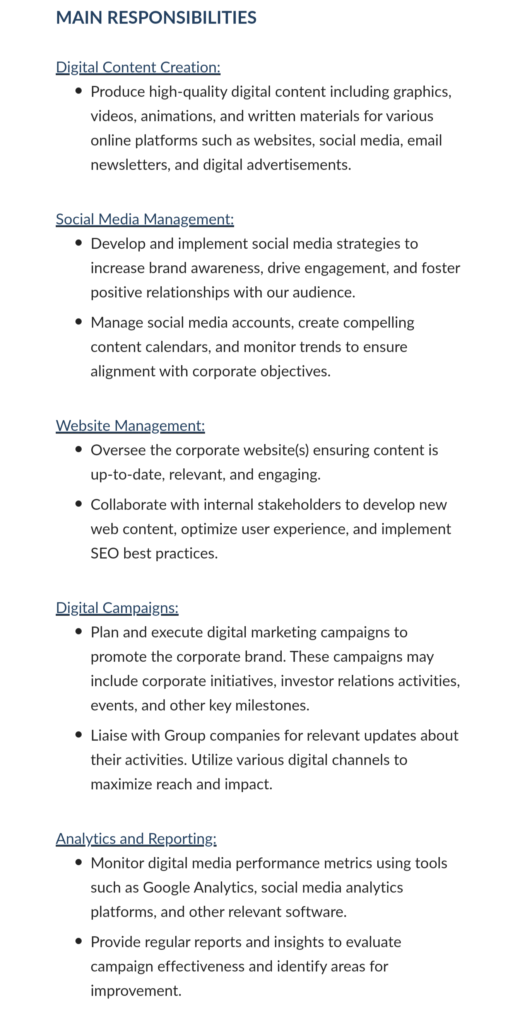
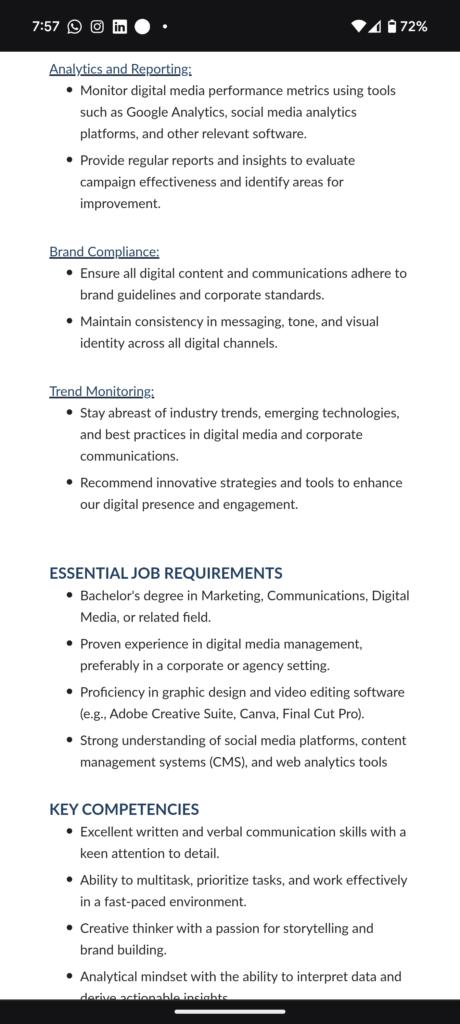
This role is particularly problematic as it combines SEO, content creation, graphic design, and social media into one job description. Each of these areas requires specialized training and ongoing education, and combining them into one role dilutes their importance. This is a clear indicator that the company has not kept pace with digital marketing evolution. Management’s lack of knowledge leads to underestimating the time, expertise, and effort needed to succeed in each discipline, creating a dysfunctional work environment and high turnover rates.
I did a deep dive into why this job is problematic here: The Digital Marketing Specialist role at Massy.
Why These Jobs Are Bad
These jobs highlight a widespread issue: companies are creating marketing roles without a true understanding of what’s involved in executing modern digital marketing strategies. By combining multiple roles and ignoring the need for specialization, companies set their teams up for failure. Employees are either overwhelmed by the workload or underperform because they are expected to be “jacks-of-all-trades,” which diminishes the quality of work.
- No Specialization: Digital marketing has many branches (social media, SEO, PPC, content marketing, etc.), and each requires dedicated attention and expertise. By lumping these responsibilities together, companies expect one person to master several complex and evolving disciplines, which isn’t realistic.
- Misaligned Education Requirements: These jobs often list outdated educational requirements, such as asking for a bachelor’s or master’s degree in Marketing or Business Administration, without acknowledging the need for certifications that reflect the real-world skillsets necessary to execute digital marketing today. For example, certifications in Google Ads, Facebook Blueprint, and SEO tools are more relevant but are rarely mentioned in local job postings. This shows a gap in HR’s understanding of modern qualifications.
- No Focus on Continued Learning: The marketing field is evolving rapidly, and any good marketing job should encourage continuous education and professional development. However, these job descriptions make no mention of ongoing training or opportunities for skill development. This not only discourages potential employees from applying but also signals that the company itself is not committed to keeping up with industry trends.
The Flawed Job Descriptions in Trinidad and Tobago
Role Compression
One of the biggest issues plaguing the marketing industry in Trinidad and Tobago is the overloading of job descriptions, where companies combine multiple specializations into a single role. This “role compression” forces candidates to be jacks-of-all-trades, which is both unrealistic and inefficient.
For example, job ads frequently ask for skills in SEO, PPC, content creation, social media management, and even graphic design, all under one title. Each of these tasks requires specialized knowledge and, in most developed markets, would be divided into separate roles. Expecting one person to execute these various tasks at a high level is impractical and can lead to poor performance across the board. Additionally, this role compression contributes to employee burnout as individuals are often overwhelmed with a workload that requires a diverse set of expertise, which no single person can fully possess.
The Digital Media Coordinator role at Atlantic Trading Co., for instance, is a prime example. The job asks for proficiency in website back-end editing, video/animation development, customer service, and social media, demonstrating a fundamental misunderstanding of what it takes to excel in each area. Similarly, the Marketing Officer position at MovieTowne requests everything from social media management to promotional strategy and graphic design skills, roles that, in other markets, would be handled by multiple professionals.
Misaligned Educational Requirements
Many job listings in Trinidad and Tobago also reflect a disconnect between the educational requirements listed and the actual skills needed for digital marketing. Companies frequently ask for traditional degrees in Marketing or Business Administration, while ignoring the fact that digital marketing today is driven by specialized certifications.
Modern digital marketing requires proficiency in tools and platforms like Google Analytics, Facebook Ads Manager, HubSpot, and various SEO tools—skills that are not typically covered in traditional marketing programs. The demand for these certifications isn’t reflected in local job descriptions, which instead emphasize outdated academic qualifications. As a result, many businesses are hiring candidates who may lack the specific technical skills needed to execute modern marketing strategies effectively. This is particularly problematic because digital marketing is a fast-paced field, where continuous learning and updated certifications are more relevant than ever.
For instance, in the Massy Digital Marketing Specialist role, there is a clear expectation for SEO, social media, content creation, and graphic design all under one umbrella. However, the educational requirements mention traditional degrees without listing any specific industry certifications like Google Ads, SEO specialization, or certifications in data analytics—skills that are fundamental to excelling in this role.
Why These Problems Exist
These flawed job descriptions suggest that management and HR teams in Trinidad and Tobago have not kept pace with the evolving marketing landscape. The blending of distinct roles into one and the reliance on traditional academic qualifications over industry-specific certifications show a fundamental gap in understanding. This gap negatively impacts companies in several ways:
- Mismatched Talent: Companies often hire people who are not fully equipped to handle the complexity of digital marketing. The mismatch in skillsets leads to subpar execution and poor performance.
- Employee Burnout: Role compression means that even qualified professionals are overburdened with too many responsibilities, leading to burnout, dissatisfaction, and eventually high turnover.
- Inefficient Teams: Without the proper structure or specialized roles, marketing teams are unable to operate at full capacity. Instead of having experts in key areas like SEO or PPC, companies rely on generalists who cannot produce high-level results in any one discipline.
Reliance on Agencies: A Broken Model
Overdependence on Agencies
Many companies in Trinidad and Tobago outsource their digital marketing efforts to agencies because they don’t have in-house expertise or the right marketing team. However, this reliance on external agencies often leads to suboptimal results. The issue isn’t necessarily the agencies themselves, but rather the companies’ inability to manage the agency relationship effectively.
Without a solid understanding of what digital marketing entails, companies fail to set the right expectations or fully leverage what an agency can offer. Agencies are typically great at executing specific tasks like media buying, running ads, or even basic social media management, but they struggle to deliver a comprehensive digital marketing strategy that is tailor-made for the company’s specific goals.
Why This Model Is Flawed
- Lack of Strategy Alignment: Agencies can deliver one-off campaigns and ads, but companies need a holistic marketing strategy that includes everything from SEO and email marketing to content strategy and analytics. Without this, the company’s marketing efforts become fragmented, and the results lack cohesion.
- Insufficient In-House Expertise: Companies don’t invest in building internal marketing teams with the skills needed to oversee and complement the agency’s work. This leaves them dependent on the agency for even the most basic functions, making it difficult to ensure the marketing aligns with business goals. The absence of in-house expertise to track campaign performance or guide the agency on specific needs leads to wasted potential.
- Agencies Are Generalists, Not Specialists: Many agencies handle multiple clients and might not specialize in the particular digital marketing needs of each business. As a result, companies don’t get tailored, high-impact solutions. The creative work may be fine, but the strategy and data-driven side of digital marketing (like audience segmentation, analytics, or conversion optimization) often suffer.
- Time Constraints and Competing Clients: Agencies have multiple clients, and because they need to prioritize workload based on client budgets, smaller companies might not receive the attention they need. Even if an agency promises high-quality work, they may not have the bandwidth to execute complex digital strategies across all their accounts.
- Missed Opportunities for Data-Driven Growth: Digital marketing should be a continuous loop of campaign execution, data collection, and optimization. Without in-house staff to monitor performance or provide valuable feedback, many companies miss out on key data insights that could help refine their marketing efforts and drive growth.
A Better Approach
To fix this reliance on agencies, companies need to invest in understanding digital marketing themselves. This could mean hiring dedicated digital marketers, providing training for internal teams, or setting clearer expectations and KPIs when working with agencies. It’s about being a partner to the agency, not just a client.
- Build In-House Expertise: Companies should hire or upskill internal team members who can oversee the agency relationship, ensuring that strategies align with business goals and performance is optimized.
- Agency Collaboration: Agencies should be seen as partners, not replacements for an in-house team. A collaborative approach allows agencies to focus on high-impact tasks like creative work, while in-house teams manage strategy and daily execution.
- Clear KPIs and Feedback Loops: Companies should set specific KPIs with their agencies and build regular feedback loops, so both parties know what’s working and what isn’t. This ensures continuous improvement and better results.
By reevaluating how they work with agencies and bringing more expertise in-house, companies can maximize the value they get from their marketing efforts and create more sustainable, long-term digital strategies.
Inadequate Compensation and Workload Mismatch
Non-Competitive Salaries
In Trinidad and Tobago, salaries for marketing roles do not align with the high expectations placed on digital marketers. While companies often seek professionals skilled in multiple areas such as SEO, content creation, social media, and graphic design, the compensation offered is often closer to that of entry-level marketing assistants. This creates a massive disparity between the workload and the pay, as employers fail to recognize the level of expertise required for digital marketing specialists.
Misalignment of Salaries and Expertise
Due to role compression, salaries in marketing are set for entry-level positions, regardless of the breadth of skills required. For instance, a digital marketing specialist is expected to juggle advanced SEO strategies, ad management, and content production, but the salary offered may be equivalent to what you would pay a junior marketing assistant. This discrepancy shows that management and HR have not grasped the complexity of digital marketing.
Is a University Degree in Marketing Worth It?
Given the mismatch between skillset requirements and compensation, one has to question whether pursuing a university degree in marketing in Trinidad and Tobago makes sense. The local job market is not producing roles with competitive salaries or environments conducive to career growth. Many companies still undervalue specialized digital marketing roles, which discourages potential candidates from investing in traditional marketing education. Instead, industry certifications focused on specific skills like SEO, PPC, and analytics could offer a more practical path, as they align better with global digital marketing trends and the real demands of the market.
High Turnover in Marketing
The combination of low pay and role compression reflects a deeper issue within the marketing industry in Trinidad and Tobago. Unless companies start offering competitive salaries and breaking down marketing tasks into specialized roles, they will continue to face high turnover rates and struggle to attract top talent. Additionally, it brings into question whether local marketing graduates will ever be able to fully leverage their skills and education in a market that doesn’t provide them with meaningful career opportunities.
Solutions to Address the Issues in Trinidad and Tobago’s Marketing Industry
- Management and HR Education
- Training Programs: Invest in workshops, seminars, and online courses focused on modern digital marketing strategies and tools. Management and HR should learn the nuances of digital marketing roles like SEO, PPC, content marketing, and social media management to properly structure teams and hire effectively.
- Leverage Industry Certifications: Encourage HR teams to prioritize relevant certifications over outdated academic degrees. Certifications in Google Analytics, HubSpot, SEO, and social media tools will ensure candidates are well-versed in current marketing trends.
- Create Specialized Roles
- Clear Job Descriptions: Companies should avoid role compression by creating specialized roles such as SEO Specialist, Social Media Manager, Content Marketer, and PPC Manager. Each area of digital marketing requires different skill sets, and by defining roles clearly, businesses can maximize efficiency and expertise.
- Hire the Right Expertise: Rather than seeking generalists who are expected to handle every aspect of marketing, companies should hire experts in specific areas of digital marketing. This will lead to better results and prevent burnout caused by overloaded roles.
- Best Hiring Practices: HR and management should learn about hiring practices tailored to modern marketing. Not every role needs to be full-time—identify which positions should be in-house and which can be outsourced to freelancers. Learning how to manage both local and global freelancers for specialized roles can help companies build flexibility while keeping budgets in check. This allows businesses to access global talent pools for areas like graphic design or PPC management without overextending their in-house teams.
- Rethink Compensation Structures
- Competitive Salaries: Adjust salary structures to reflect the expertise required for each specialized role. By offering competitive compensation that matches industry standards, companies can attract top talent and reduce employee turnover.
- Incentivize Skill Development: Encourage continuous learning by offering incentives for employees who complete relevant certifications and improve their digital marketing skills. This ensures the team stays up-to-date with the latest trends and technologies.
- Build Stronger Agency Relationships
- Strategic Partnerships with Agencies: Instead of relying solely on agencies to handle all marketing efforts, companies should aim to build a collaborative partnership where in-house teams manage strategic goals and agencies focus on execution. This leads to better alignment and more effective marketing campaigns.
- Set Clear KPIs: Companies should set clear objectives and key performance indicators (KPIs) when working with agencies to ensure that campaigns are aligned with business goals and provide measurable results.
- Develop In-House Expertise
- Internal Digital Teams: While agencies can provide valuable support, companies should invest in building their in-house digital marketing teams. These teams can oversee strategy, execution, and the continuous improvement of campaigns, providing more control over marketing efforts and enabling data-driven decisions.
- Cross-Departmental Collaboration: Foster collaboration between marketing, HR, and management to ensure marketing strategies align with overall business objectives. This approach helps integrate marketing into the broader company vision and avoids siloed operations.
- Focus on Continuous Learning and Adapting
- Upskilling Programs: Offer regular training sessions and access to digital marketing resources, both for current employees and new hires. Continuous education is essential in an industry that is evolving rapidly with the rise of AI, automation, and new digital tools.
- Stay Current with Trends: Encourage management and teams to stay current with digital marketing trends by attending conferences, subscribing to industry publications, and participating in online courses. This not only improves marketing efforts but also positions the company as a forward-thinking employer.
By implementing these solutions, companies in Trinidad and Tobago can begin to close the knowledge gap in digital marketing, create effective marketing teams, and offer competitive roles that attract and retain top talent.
With all of the bad jobs floating around the market, this will always cause the best talent to move to more productive markets or work remotely for companies and clients outside of the local job market. We cannot attract or retain top talent in this current landscape.
With better understanding and alignment, the marketing industry can thrive, driving business success in an increasingly digital world.
To answer the question: Are there any good marketing jobs in Trinidad and Tobago? Currently, the answer is no (or at least very very few). However, this can change if companies make the necessary adjustments.
The key areas for improvement include management and HR investing in education about modern marketing practices, creating specialized roles rather than combining multiple functions into one, offering competitive compensation, and learning how to collaborate effectively with agencies and freelancers.
As we approach 2025, companies must evolve by modernizing their approach to marketing, ensuring they’re equipped to compete in the digital age. With these improvements, the marketing landscape in Trinidad and Tobago has the potential to thrive, offering meaningful and rewarding career opportunities.
If you are looking for a marketing consultant to contact to evaluate your marketing operations, feel free to connect with me here —> Contact Me.
Feel free to connect with me on Linkedin as well –> Keron Rose Linkedin.

Personally I find all employers does be like slave drivers and the marketing professionals does bow to these Human Resources witches and clueless managers to make a project come to life, I dunno when these clueless people will understand when you break up each task into a proper employment role that you will create more opportunity for your entitled university graduants who are better off cleaning fish at queens wharf.